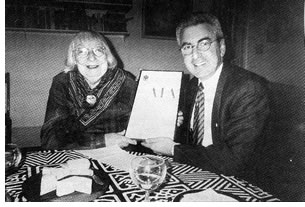

5/2006

 Urban activist, prolific
author, and insightful philosopher Jane Jacobs, 89, died in a Toronto
hospital April 25 of an apparent stroke. The woman willing to go to jail
for a cause—as she did in 1968 while successfully fighting an expressway
that would have bisected Lower Manhattan—or expatriate from her
beloved native nation—as she did when she emigrated from the U.S.
to Canada in opposition to the Vietnam War, also in 1968—is best
known for her 1961 classic, The Death and Life of Great American Cities.
Urban activist, prolific
author, and insightful philosopher Jane Jacobs, 89, died in a Toronto
hospital April 25 of an apparent stroke. The woman willing to go to jail
for a cause—as she did in 1968 while successfully fighting an expressway
that would have bisected Lower Manhattan—or expatriate from her
beloved native nation—as she did when she emigrated from the U.S.
to Canada in opposition to the Vietnam War, also in 1968—is best
known for her 1961 classic, The Death and Life of Great American Cities.
Acerbic yet approachable, academia-phobic yet consummately intellectual, irrepressible, and irreplaceable, Jacobs claimed her interest in urban decay stemmed from her Depression-stricken home city of Scranton, Pa. It was in New York City, to which she moved in the mid-’30s, that she learned what work life and city life could be, she said.
Jacobs honed her writing throughout the Depression and war years, including articles in the Sunday Herald Tribune and service with the Office of War Information. In 1952, she began her 10-year city-planning beat at Architectural Forum. In 1968, she left the U.S. for Toronto, where her husband, architect Robert Jacobs, had a hospital commission. She also cited her unwillingness to support the war and possibly lose her then-draft-age sons, Jim and Ned. Husband Robert died in 1996. Jacobs is survived by her two sons and a daughter, Burgin.
Copyright 2006 The American Institute of Architects.
All rights reserved. Home Page ![]()
![]()
In 1998, AIA President Ronald A. Altoon, FAIA, hand-delivered a Presidential Citation to Jane Jacobs for her contributions to the creation of livable communities. (Photo by Raymond P. Rhinehart, Hon. AIA.)
![]()